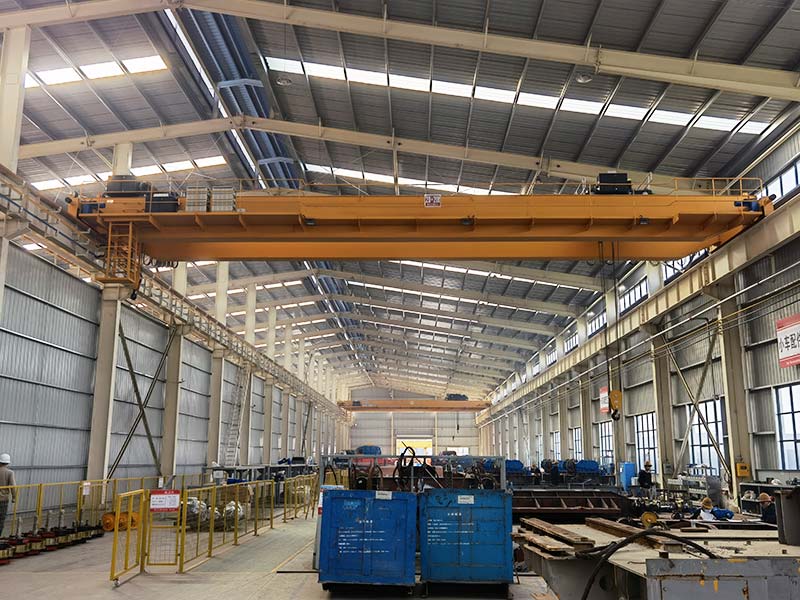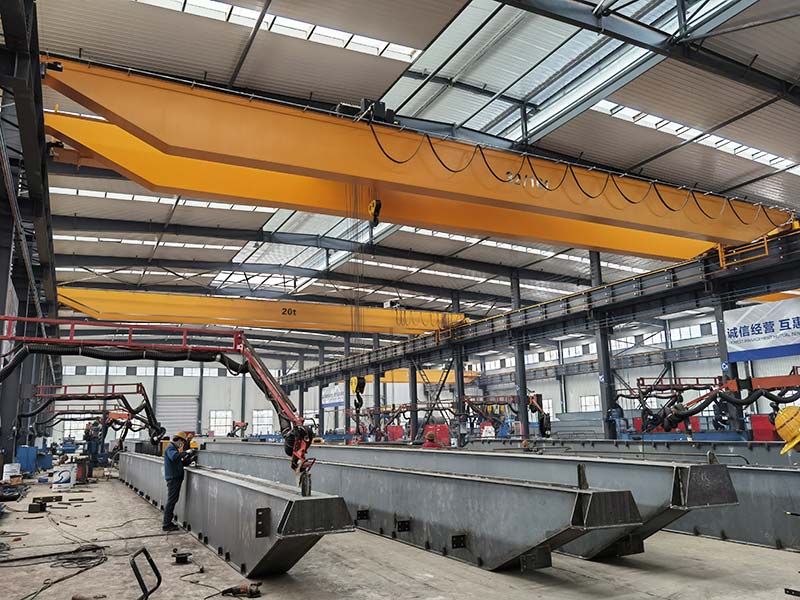Overhead cranes are integral to many industrial environments, offering unparalleled efficiency and safety for lifting and transporting heavy loads. In workshop settings, where precision and reliability are paramount, these cranes play a crucial role. This article delves into the various applications of workshop overhead cranes and highlights the numerous benefits they provide.

Applications of Overhead Cranes in Workshops
- Material Handling
In workshops, overhead cranes are primarily used for material handling. They facilitate the movement of raw materials, semi-finished products, and finished goods. For instance, in metalworking workshops, these cranes transport heavy metal sheets, bars, and other materials from storage to the processing area. This streamlined material handling reduces manual lifting, minimizing the risk of injuries and enhancing operational efficiency.
- Assembly and Disassembly
Overhead cranes are essential for the assembly and disassembly of large components. In workshops that deal with complex machinery or structures, these cranes lift and position parts with precision. For example, in a workshop specializing in machinery maintenance, an overhead crane can be used to lift heavy engine parts or machinery components, facilitating easier assembly or disassembly. This capability not only speeds up the process but also ensures the accuracy of component placement.
- Tool and Equipment Handling
Workshops often require frequent adjustments and repositioning of tools and equipment. Overhead cranes simplify this process by allowing operators to lift and move heavy tools or equipment effortlessly. In a manufacturing workshop, an overhead crane might be used to move large tools or molds between different workstations, improving workflow and reducing downtime.
- Heavy Load Transport
Workshops frequently handle heavy loads that are difficult to move manually. Overhead cranes are designed to handle such loads with ease. Whether it’s transporting a large workpiece across the workshop or moving heavy machinery, these cranes provide the necessary lifting capacity. For example, in a fabrication workshop, an overhead crane can move large metal structures from the welding area to the inspection area, streamlining the production process.
- Maintenance and Repairs
Overhead cranes are invaluable in maintenance and repair operations. They are used to lift and support heavy machinery or components during maintenance procedures. In a workshop environment, this means that operators can perform repairs more efficiently, with better access to various parts of the equipment. For example, in a workshop servicing large industrial machines, an overhead crane can lift and support the machine while technicians perform necessary repairs. Also learn about our other crane solutions for workshop: https://aicraneliftingsolution.com/gantry-cranes/workshop/

Benefits of Overhead Cranes in Workshops
- Enhanced Safety
Safety is a top priority in any workshop, and overhead cranes contribute significantly to a safer work environment. By reducing the need for manual lifting, these cranes help prevent injuries related to heavy lifting and repetitive strain. Additionally, overhead cranes are equipped with safety features such as overload protection and emergency stop functions, further enhancing workplace safety.
- Increased Efficiency
The use of overhead cranes significantly boosts efficiency in workshop operations. By automating the lifting and movement of heavy loads, these cranes reduce the time and effort required for material handling. This efficiency translates to shorter production cycles, faster turnaround times, and overall improved productivity. In a workshop setting, where time is often a critical factor, the speed and efficiency provided by overhead cranes can be a game-changer.
- Improved Precision
Overhead cranes offer precise control over load positioning, which is crucial for tasks that require accuracy. In workshops that involve detailed assembly or fabrication, the ability to position loads precisely ensures that components are aligned correctly. This precision reduces the likelihood of errors, improving the overall quality of the finished products.
- Flexibility and Versatility
Overhead cranes are highly versatile and can be adapted to various workshop applications. They come in different configurations, such as single girder, and double girder crane designs, allowing them to meet the specific needs of different workshops. Whether it’s handling lightweight tools or transporting heavy machinery, overhead cranes can be customized to suit the requirements of the workshop environment.
- Space Optimization
Workshops often have limited floor space, and overhead cranes help optimize this space. By utilizing vertical space, these cranes allow for efficient use of the workshop area. For instance, materials and tools can be stored above the floor, freeing up valuable workspace for other activities. This space optimization is particularly beneficial in smaller workshops where floor space is at a premium.
- Cost Savings
Although the initial investment in an overhead crane may be significant, the long-term cost savings can be substantial. By improving efficiency and reducing labor costs associated with manual handling, these cranes offer a favorable return on investment. Additionally, the durability and low maintenance requirements of overhead cranes contribute to lower operational costs over time.
- Enhanced Worker Comfort
Overhead cranes improve worker comfort by reducing the physical demands of manual lifting. Operators can control the crane from a safe distance, minimizing physical strain and fatigue. This enhanced comfort contributes to a more positive work environment and can lead to increased job satisfaction and productivity.
- Reduced Risk of Damage
The precision and control offered by overhead cranes help minimize the risk of damage to materials and equipment. By handling loads gently and accurately, these cranes reduce the likelihood of accidental drops or collisions, which can result in costly repairs or replacement. In a workshop setting, where the quality of materials and equipment is crucial, this reduced risk of damage is a significant advantage.
Conclusion
Overhead cranes are indispensable tools in workshops, offering a wide range of applications and benefits. From material handling and assembly to maintenance and repairs, these cranes enhance operational efficiency, safety, and precision. Their ability to handle heavy loads, improve worker comfort, and optimize space makes them a valuable asset in any workshop environment. As industries continue to evolve, the role of overhead cranes in workshops will remain vital, driving advancements in productivity and safety. Investing in overhead cranes is not just a decision for today but a step towards a more efficient and secure future in workshop operations.
